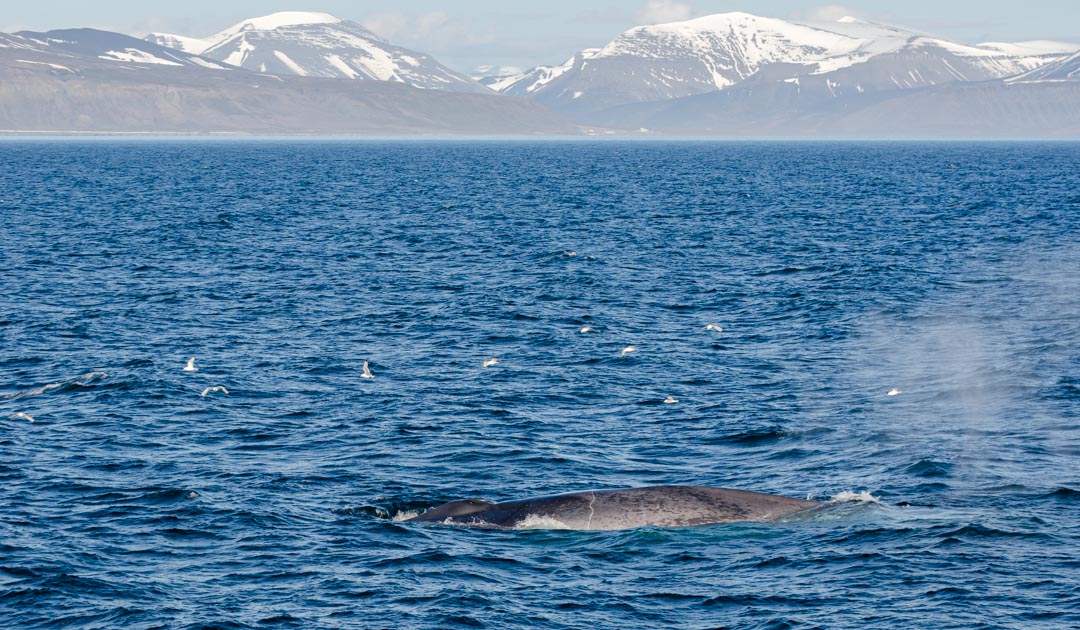
Blue whales are the largest animals that have ever lived on our planet. So it’s hardly surprising that they are also the loudest animals on Earth. And yet we humans can barely hear their 180-decibel songs – a volume comparable to a jet plane. Blue whales sing at such low frequencies that we have to play recordings of their songs at least twice the speed to hear them well. After analyzing old recordings, two whale researchers found that the whales’ songs have become even lower since the 1960s. But what are the reasons for this?
The two researchers, actually physicists, John Hildebrand and Mark McDonald first discovered the unusual decrease in sound frequencies in blue whales off the coast of southern California, where the frequencies had dropped by 30 percent over 40 years. They then also studied blue whale populations in Antarctica. Here, they observed the same: The frequency of the songs decreased.
The same trend can be seen in more recent recordings from the northeast Pacific, from 2006 to 2019. While the frequency of a so-called ‘B call’ was between 46 and 49 hertz in 2006, it dropped to 41 to 45 hertz by 2019.
However, the researchers did not find a conclusive explanation for the change in pitch. The largest animals on Earth, with a length of about 30 meters and a weight of up to 200 tons, gave scientists one of the greatest mysteries of blue whale research.

Over the past several decades, Hildebrand, McDonald, and other researchers have attempted to solve this puzzle, posing several hypotheses: variations in ocean acidity related to climate change, whaling-related shifts in average whale size and population density, and increasing underwater noise. But none of these hypotheses really fit with the corresponding data.
Instead, it became even more puzzling, as whale researcher Alexander Gavrilov of Australia found that the frequencies of the songs vary depending on the season. His team also discovered that southern right whale songs also decreased in frequency and then increased again by a few hertz. Fin whales and bowhead whales are reported to show similar declines in frequency, according to further studies by other researchers.
According to a recent study this year by John Hildebrand, Ally Rice and other researchers at the Scripps Institute of Oceanography, the frequencies of California blue whales have reached a plateau, potentially supporting the population recovery hypothesis. However, the authors disagree about this. Mainly because the different growth rates of the different populations do not correlate with the global linear declining frequencies.
Blue whale populations in the Arctic, for example, are still growing quite rapidly in contrast to that in the Northeast Pacific. “I would say on my list of questions about blue whales that are unanswered, this is number one because I have not seen a good explanation,” Trevor Branch of the University of Washington tells the online platform Nautilus.
If future research does prove the population growth theory to be correct, a method would have been found to estimate population sizes more accurately. So far, population figures are based only on extrapolations from sightings, which are very inaccurate.

“It would be sort of stunning,” says McDonald, to have a simple formula for estimating whale populations. However, he is not sure if the question of why blue whale songs change can ever be answered. “It’s just not like quantum mechanics and particle physics, you know. Biological systems are just too complicated. Physicists like to have it all make sense. Biological systems, they can be crazy.”
In any case, the mystery remains unsolved, something Rice not only regrets: “I like that the whales get to keep some of their mysteries, right? We don’t just get to know everything about them.”
Julia Hager, PolarJournal
More on the subject:





